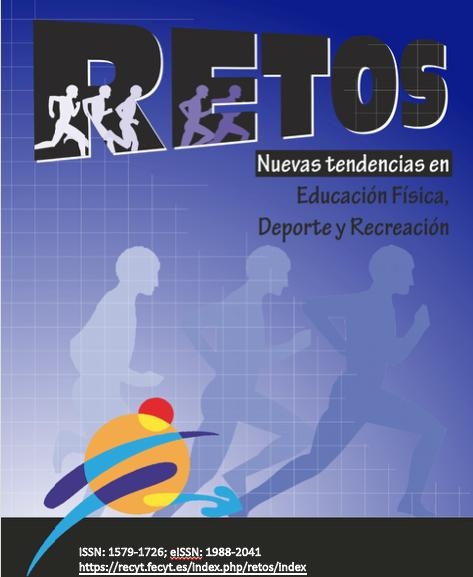Translation and validation of the Irrational Performance Beliefs Inventory (iPBI) in a sample of Mexican athletes
DOI:
https://doi.org/10.47197/retos.v62.109888Keywords:
REBT, Irrational beliefs, Athletes, Beliefs, EmotionsAbstract
This article shows the results of a study validating the Irrational Performance Beliefs Inventory (iPBI) in a population of Mexican athletes are presented. The study is correlational-causal in nature, in which the iPBI was translated from English to Spanish, a translation that was validated by four experts in the field of. Subsequently, this translated version was administered to a sample of 315 Mexican athletes. The results indicate that the translation was satisfactorily validated by the experts, and through a Confirmatory Factor Analysis, it was found that the original 28-item model initially showed an unacceptable factor loading. To achieve a better model fit, 9 items were removed, resulting in a 19-item version with a Comparative Fit Index (CFI) of 0.995 and a Cronbach's Alpha of 0.902, indicating excellent internal consistency. In conclusion, the procedure allowed for the validation of the translation and the adjustment of the original model, thus achieving a suitable tool for measuring irrational beliefs in Mexican athletes. This study provides a validated Spanish version of the iPBI that can be used in future research and sports practice, facilitating the identification and management of irrational beliefs in the sports field in Mexico.
References
Chrysidis, S., Turner, M., y Wood, A. (2020). The effects of REBT on irrational beliefs, self-determined motivation, and self-efficacy in American Football. Journal of Sports Sciences, 38(19), 2215-2224.
Chotpitayasunondh, V., y Turner, M. (2019). The development and validation of the Thai-translated irrational performance beliefs inventory (T-iPBI). Journal of Rational-Emotive y Cognitive-Behavior Therapy, 37, 202-221.
Dryden, W. (2022). Reason to Change: A Rational Emotive Behaviour Therapy Workbook 2nd Edition. Routledge.
Hair, J., Ringle C. y Sarstedt, M. (2011) PLS-SEM: Indeed a silver bullet. J. Market. Theory Pract. 19: 139-151
INEGI (2023). Módulo de Práctica Deportiva y Ejercicio Físico (MOPRADEF). Recuperado de: https://www.inegi.org.mx/contenidos/saladeprensa/boletines/2024/MOPRADEF/MOPRADEF2023.pdf
Kaiser, H. (1974) An index of factorial simplicity. Psychometrika 39: 31-36.
Levy J. y Varela, J. (2006) Modelización con Estructuras de Covarianza en Ciencias Sociales. Netbiblo. La Coruña, España. 517
Jordana, A., Ramis, Y., Chamorro, J., Pons, J., Borrueco, M., De Brandt, K., & Torregrossa, M. (2023). Ready for failure? Irrational beliefs, perfectionism and mental health in male soccer academy players. Journal of Rational-Emotive & Cognitive-Behavior Therapy, 41(2), 454-477.
Jordana, A., Turner, M. J., Ramis, Y., & Torregrossa, M. (2020). A systematic mapping review on the use of Rational Emo-tive Behavior Therapy (REBT) with athletes. International Review of Sport and Exercise Psychology, 16(1), 231-256.
Maxwell-Keys, C., Wood, A. G., y Turner, M. (2022). Developing decision making in Rugby Union match officials using rational emotive behavior therapy (REBT). Psychology of Sport and Exercise, 58, 102098
Michel-Kröhler, A., y Turner, M. (2022). Link between irrational beliefs and important markers of mental health in a Ger-man sample of athletes: Differences between gender, sport-type, and performance level. Frontiers in psychology, 13, 918329.
Miller, A., Calder, B., Turner, M., y Wood, A. (2023). Exploring the association between irrational beliefs, motivation regulation and anxiety in ultra-marathon runners: a mixed methods approach. Journal of Rational-Emotive y Cognitive-Behavior Therapy, 41(2), 392-410.
Muñiz, J., Elosua, P. y Hambleton, R. (2013). Directrices para la traducción y adaptación de los tests: segunda edición. Psico-thema, 25(2), 151-157.
Nejati, M., Farsi, A., Moteshareie, E., y Turner, M. (2022). The persian irrational performance beliefs inventory (iPBI-Persian): Translation, confirmatory factor analysis, and test–retest reliability, in iranian athletes. Journal of Rational-emotive y Cognitive-behavior Therapy, 40(2), 191-205.
Turner, M., y Allen, M. (2018). Confirmatory factor analysis of the irrational Performance Beliefs Inventory (iPBI) in a sample of amateur and semi-professional athletes. Psychology of Sport and Exercise, 35, 126-130–130.
Turner, M., Allen, M. S., Slater, M., Barker, J., Woodcock, C., Harwood, C. y McFadyen, K. (2018). The development and initial validation of the irrational performance beliefs inventory (iPBI). European Journal of Psychological Assessment, 34, 174-180.
Turner, M., Goldman, S., & Terjesen, M. (2023). Introduction to the special issue on the application of rational emotive behavior theory and practice to high-performance settings. Journal of Rational - Emotive & Cognitive - Behavior Therapy, 41(2), 247-250.
Turner, M., y Barker, J. (2013). Examining the efficacy of rational-emotive behavior therapy (REBT) on irrational beliefs and anxiety in elite youth cricketers. Journal of Applied Sport Psychology, 25(1), 131-147.
Turner. M. y Barker, J. (2014). Using Rational Emotive Behavior Therapy with athletes. The Sport Psychologist. 28, 75-90.
Downloads
Published
How to Cite
Issue
Section
License
Copyright (c) 2024 Alvaro Eduardo Alarcon-Padilla, Francisco Javier Mendoza Farías, Carlos Federico Miranda Medina, José Luis Cantú-Mata, Daniel Gómez Gibal

This work is licensed under a Creative Commons Attribution-NonCommercial-NoDerivatives 4.0 International License.
Authors who publish with this journal agree to the following terms:
- Authors retain copyright and ensure the magazine the right to be the first publication of the work as licensed under a Creative Commons Attribution License that allows others to share the work with an acknowledgment of authorship of the work and the initial publication in this magazine.
- Authors can establish separate additional agreements for non-exclusive distribution of the version of the work published in the journal (eg, to an institutional repository or publish it in a book), with an acknowledgment of its initial publication in this journal.
- Is allowed and authors are encouraged to disseminate their work electronically (eg, in institutional repositories or on their own website) prior to and during the submission process, as it can lead to productive exchanges, as well as to a subpoena more Early and more of published work (See The Effect of Open Access) (in English).
This journal provides immediate open access to its content (BOAI, http://legacy.earlham.edu/~peters/fos/boaifaq.htm#openaccess) on the principle that making research freely available to the public supports a greater global exchange of knowledge. The authors may download the papers from the journal website, or will be provided with the PDF version of the article via e-mail.


